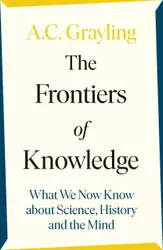This book aims to be a description of the current state of humanity’s knowledge in three main areas. These are science (focusing on fundamental physics), history and neuroscience. The book is divided into three sections and each of these topics is tackled in turn. Throughout the book, Grayling writes about the philosophy of science (and history), particularly the problems that occur when trying to understand the truth. These problem are things like the “pinhole problem” which means that, when we investigate the universe, we can only see that tiny part of the universe that we have access to in our present location and time. If things are different outside this narrow range, our theories may be inaccurate.
Each section gives us a run-down of the progress that has been made on that topic since ancient times. So in the science section we start with the ancient Greeks and their scientific philosophizing. Then there is quite a gap until science begins “properly” around the time of the renaissance in Europe. This section of the book focuses on fundamental physics and cosmology. We get descriptions of quantum mechanics and general relativity, and some discussion about their incompatibilities and the possible solutions. Mention is made of theories like loop quantum gravity and string theory as possible approaches to uniting the incompatible theories of quantum mechanics and general relativity. This section covers some of the same ground as Reality Is Not What It Seems, although that book was written by a quantum gravity researcher, so not much was said there about string theory. The Frontiers of Knowledge is not really aiming to teach the reader about these theories though; it’s not pedagogical in that way. Instead, we get a lot more discussion about the philosophy of science, and what the obstacles are to making progress on increasing our understanding of the universe.
After science comes history. Here the focus is on the evolution of homo sapiens and on our understanding of the development of civilizations throughout history. There are two chapters that I would describe as being about the philosophy of history, covering issues like whether archaeology and history should be mainly about the verifiable facts of what happened, or whether they should interpret the events of the past, and what inaccuracies that might introduce. One example here is how we tend to assume that any large building was used for religious ceremonies in the past, when this is certainly not true of most of the large buildings in our own civilization. The book goes on to discuss issues like denial versus revision of history, and whether it’s possible for our understanding of historical events to ever be free of our unconscious biases.
I was surprised to learn that most of our knowledge of ancient civilizations (before the Ancient Greeks) was constructed from archaeological evidence rather than being handed down through the generations. The Ancient Greeks probably didn’t know about the Sumerians, for example, who preceded them by a few thousand years. I was also surprised to learn that genetic studies, modelling the movement of people around the world in ancient times, suggest that the builders of Stonehenge were almost totally replaced by immigrants from the Yamnaya culture only a few hundred years after building the monument.
The final section of the book covers the mind. Again, we go back to the ancient Greeks, who speculated about the nature of mind and consciousness. This section covers how our understanding of the brain as the seat of consciousness developed. There was much discussion in the past about whether it might be the heart instead, and these ideas continue to the present day in the use of the heart as a metaphor for the emotional aspects of our lives. Some of this section overlaps a bit with what I read about in Being You and is a little lightweight in comparison. But there is more speculation here about the nature of consciousness and comparison with other ideas and approaches for explaining consciousness than that book had.
I really enjoyed reading this book, and I found myself looking forward to picking it up again each day. I particularly enjoyed the mix of fact and philosophy that gave me a new appreciation for the things we’ve discovered about our universe, and ourselves, and that made me ponder the deeper nature of our scientific investigations.
